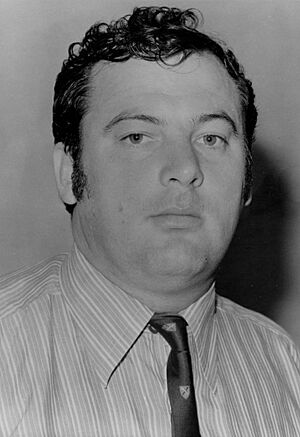Paul Everingham facts for kids
Quick facts for kids
Paul Everingham
|
|
|---|---|
 |
|
| Member of the Australian Parliament for Northern Territory |
|
| In office 1 December 1984 – 5 June 1987 |
|
| Preceded by | John Reeves |
| Succeeded by | Warren Snowdon |
| 1st Chief Minister of the Northern Territory | |
| In office 1 July 1978 – 15 October 1984 |
|
| Deputy | Marshall Perron (1978–1983) Nick Dondas (1983–1984) |
| Preceded by | Himself as Majority Leader |
| Succeeded by | Ian Tuxworth |
| 2nd Majority Leader of the Northern Territory | |
| In office 13 August 1977 – 30 June 1978 |
|
| Deputy | Marshall Perron |
| Preceded by | Goff Letts |
| Succeeded by | Himself as Chief Minister |
| Member of the Northern Territory Parliament for Jingili |
|
| In office 19 October 1974 – 22 October 1984 |
|
| Preceded by | First member |
| Succeeded by | Rick Setter |
| Personal details | |
| Born | 4 February 1943 Brisbane, Queensland, Australia |
| Political party | Country Liberal Party Liberal Party |
| Children | 4 kids |
| Profession | Barrister, solicitor |
| Cabinet | Everingham Ministry |
Paul Anthony Edward Everingham is a former Australian politician. He was born on February 4, 1943. Paul Everingham was a very important leader in the Northern Territory of Australia. He served as the last Majority Leader and then became the first Chief Minister of the Northern Territory.
He was the head of the Northern Territory government from 1977 to 1984. He represented the area of Jingili in Darwin in the local parliament. Later, he was elected to the Australian national parliament. He was a member of the Country Liberal Party and the Liberal Party.
Contents
Paul Everingham's Political Career
Paul Everingham started his political journey in the Northern Territory. He was elected to the new Northern Territory Legislative Assembly in October 1974. This was a big step for the Northern Territory's own government.
Early Roles in Territory Politics
From 1974 to 1975, he briefly served as the Deputy Majority Leader. This role was similar to a deputy premier in other Australian states. After this, he worked as a regular member of parliament.
Becoming a Leader in the Northern Territory
In 1977, Paul Everingham became the leader of the Country Liberal Party (CLP). He was then named the Majority Leader. This happened after the previous leader lost his seat, even though the CLP won the election easily.
He was in charge during a big change for the Northern Territory. In 1978, the Territory gained "self-government." This meant it could make more of its own decisions. At this time, Paul Everingham became the first Chief Minister. This new role gave him much more power.
He led the CLP to big election wins in 1980 and 1983. During his time as Chief Minister, the Northern Territory was mostly run by one party. He was the youngest person ever to become a head of government in the Territory, taking the role at 34 years old.
Moving to National Politics
In October 1984, Paul Everingham decided to leave his role in the Northern Territory. He wanted to become a member of the Australian House of Representatives. This is part of Australia's national parliament. He ran for the Northern Territory seat in the 1984 federal election.
Joining the Federal Parliament
He won the election and became a federal Member of Parliament. After his election, both the Liberal and National parties wanted him to join their groups. In December 1984, he chose to sit with the Liberal Party.
Because of his experience as Chief Minister, he was quickly given an important job. He became a "Shadow Minister" for Local Government and Northern Development. This meant he was part of the opposition team that watched over these areas. He held this role until September 1985.
Leaving Federal Politics
It was reported in December 1985 that Paul Everingham and his family planned to move to Brisbane. He decided not to run for re-election in the 1987 federal election.
Life After Politics
After leaving the national parliament, Paul Everingham continued to be involved in politics. He served as the President of the Queensland Liberal Party. He held this position from 1990 to 1994.
He resigned from this role in 1994. This happened during talks about merging the Liberal and National Parties in Queensland. The two parties eventually merged in 2008.
In 2019, Paul Everingham and two other former CLP chief ministers spoke out. They called for new leaders to replace a retiring senator.
 | Lonnie Johnson |
 | Granville Woods |
 | Lewis Howard Latimer |
 | James West |

